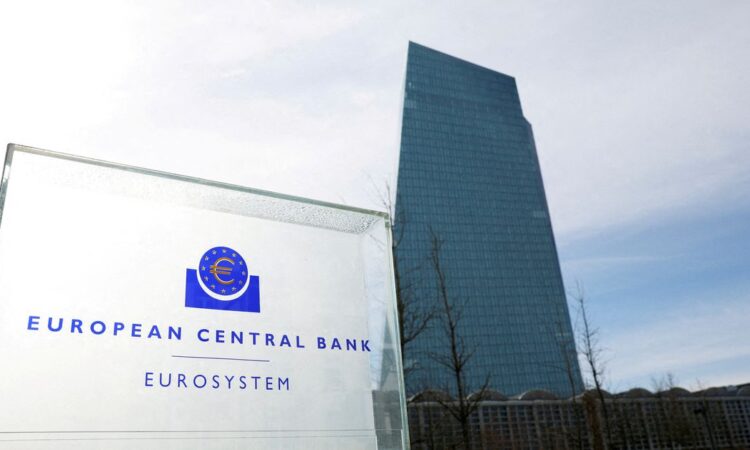
[1/2]A view shows the logo of the European Central Bank (ECB) outside its headquarters in Frankfurt, Germany March 16, 2023. REUTERS/Heiko Becker/File Photo Acquire Licensing Rights
FRANKFURT, Sept 21 (Reuters) – Euro zone inflation is stubbornly high with upside risks, so the European Central Bank’s next move could still be a rate increase before cuts come onto the agenda, several policymakers said on Thursday.
The ECB has raised its deposit rate at each of its past 10 meetings, to a record-high 4% last week. But it signalled it would pause in October, leading markets to price out the chance of any further hikes on the premise that weak growth would dissuade policymakers from tightening.
“Have we reached the plateau (in interest rates)? That is not yet clear,” German Bundesbank President Joachim Nagel told a banking conference on Thursday.
“The inflation rate in the euro zone is also not moving toward 2% at the desired pace … (and) core inflation remains stubbornly high and is expected to fall only gradually.”
Belgian policymaker Pierre Wunsch argued that the risk of a hike is still significant, even if he was becoming more comfortable with the ECB’s own projections, which show price growth back at target by the end of 2025.
“The risk that we would have to do more is significant,” Wunsch told the Reuters Global Markets Forum. “I’m not sure we should put a number on it, but it’s certainly more than 10% and I think it’s not that far from 50%.”
Martins Kazaks, Latvia’s central bank chief, meanwhile argued that a recent rise in energy prices creates an upside risk for inflation.
“The recent oil price increase in my view is not a temporary or transitory, it’s very much a structural issue,” Kazaks said. “This does create upside risks in my view for inflation.”
Brent crude prices are up by a quarter in the past three months while natural gas costs have also surged, though that is partly due to aggressive efforts to fill European gas storage well before the heating season.
Pushing back on the hawkish comments, Greek central bank chief Yannis Stournaras took a different view, arguing that even the last rate hike may not have been justified.
“I think we have reached the interest rate peak,” Boersen-Zeitung quoted Stournaras as saying on Thursday. “As things stand, I assume that our next step will be an interest rate cut.”
All policymakers said they expected rates to stay high for some time but differed on the timing of the first cut, with Stournaras calling for steady rates for a “few months” while Kazaks said he expected no cut in the first half of 2024.
Rates should be cut only when inflation projections start to consistently undershoot the ECB’s 2% target, Kazaks argued.
Inflation, still above 5%, is expected to remain over 3% next year and slow to 2.1% in 2025, falling below target only in the final quarter of that year.
Before any cut, Kazaks said, the ECB needs to discuss the future of its bond-buying schemes, including a possible early end to reinvestments in the Pandemic Emergency Purchase Programme and starting outright bond sales from the Asset Purchase Programme.
Wunsch and Kazaks both said their base case for the euro zone economy was for weak growth rather than a recession, as feared by some.
Join GMF, a chat room hosted on Refinitiv Messenger: https://tinyurl.com/yyr3x6pu)
Reporting by Divya Chowdhury in Mumbai, Francesco Canepa and Balazs Koranyi; Editing by Mark Heinrich, Philippa Fletcher and Catherine Evans
Our Standards: The Thomson Reuters Trust Principles.





